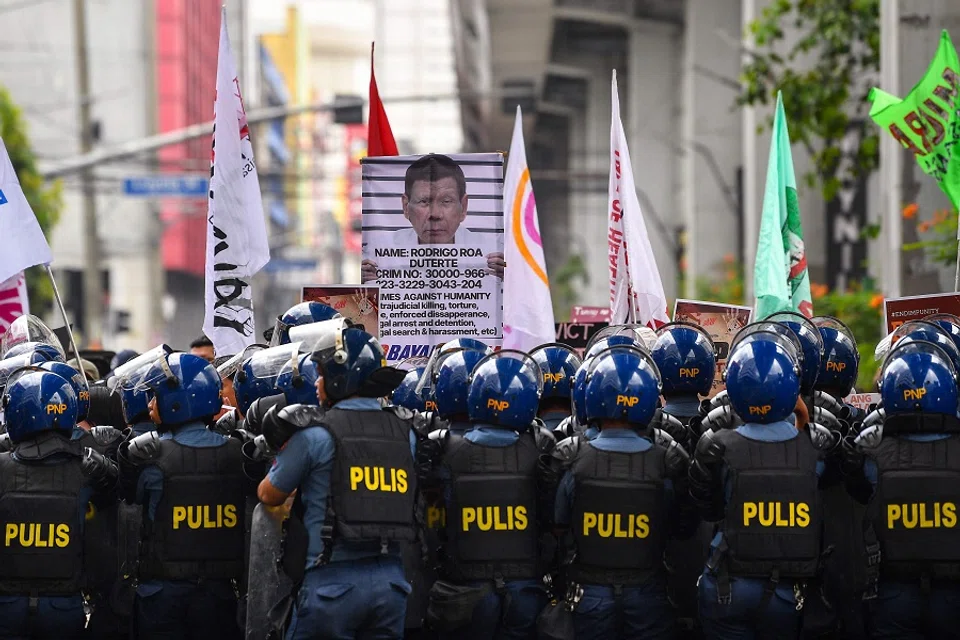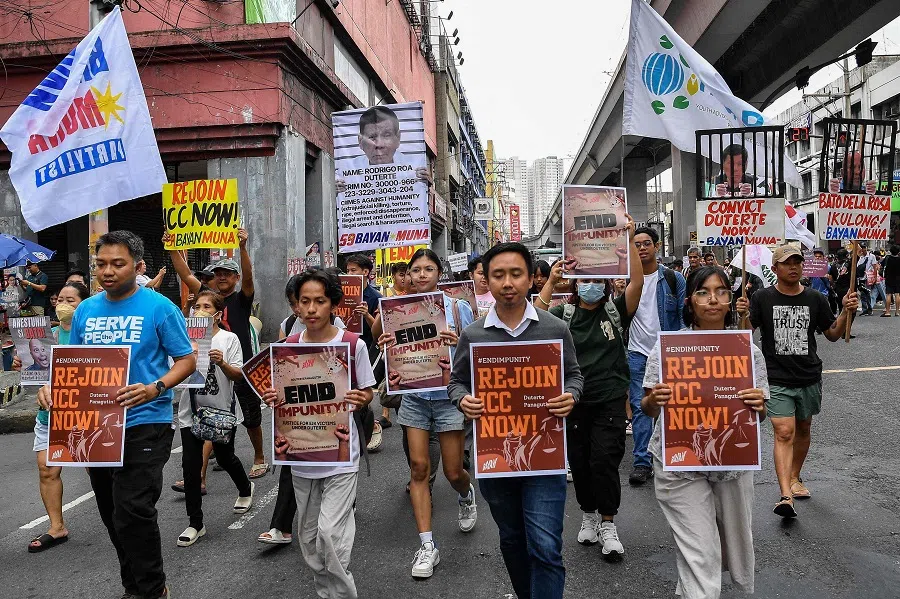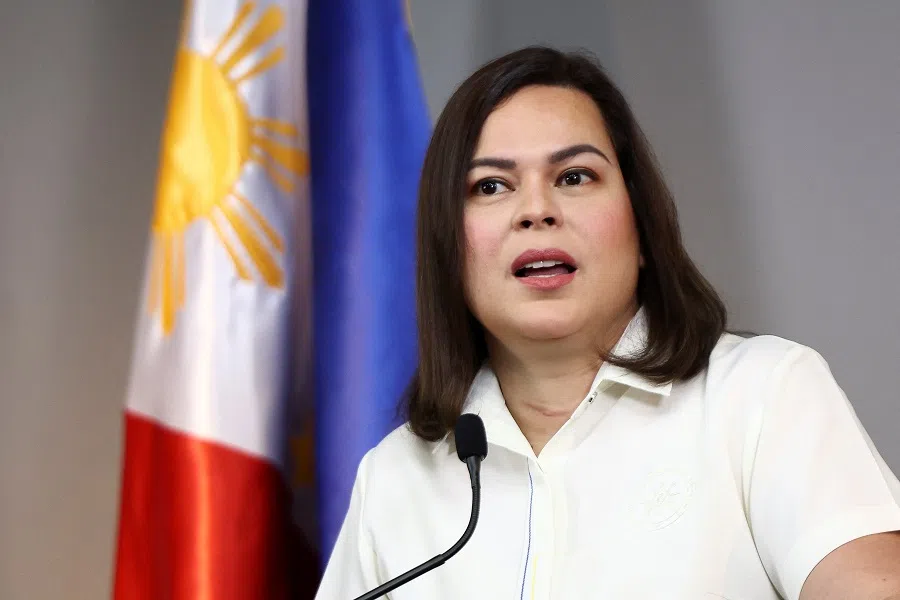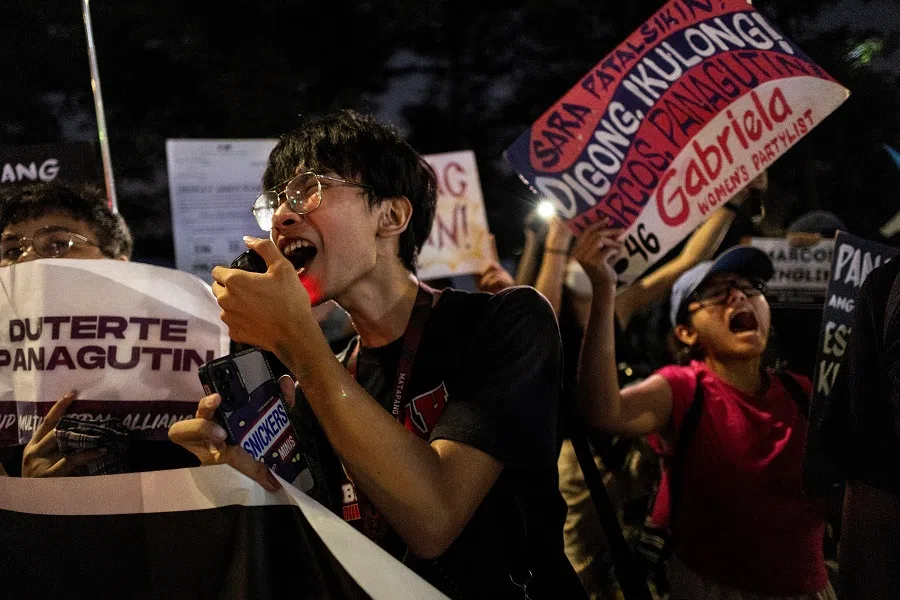Can Sara Duterte turn the ICC trial into a political comeback in the Philippines?
Duterte’s ICC arrest marks a pivotal moment for both Philippine politics and international justice in Asia, with potential impacts on the Duterte-Marcos rivalry and the ICC’s global credibility, says academic Hao Nan.

On 11 March 2025, former Philippine President Rodrigo Duterte was arrested upon returning from Hong Kong and “forcibly taken” by flight to The Hague under warrants issued by the International Criminal Court (ICC) and Interpol at the request of the ICC. On 14 March, Rodrigo appeared before Pre-Trial Chamber I of the International Criminal Court for the first time for identity verification, and the Chamber provisionally scheduled the confirmation of charges hearing to begin on 23 September 2025.
Whether Rodrigo Duterte could become the first Asian former head of state to go on trial at the ICC, marks a significant political and legal turning point, not just for the Philippines but for the ICC’s credibility in enforcing international justice across Asia. The event has sparked a heated political battle within the Philippines, particularly between the Marcos and Duterte political families, whose once-unified front has fractured into direct opposition.
The pro-US, northern-based Marcos family and the pro-China, southern-based Duterte family, once paired to overwhelmingly win the 2022 presidential election...
Duelling families: Survival at stake
The pro-US, northern-based Marcos family and the pro-China, southern-based Duterte family, once paired to overwhelmingly win the 2022 presidential election with Ferdinand “Bongbong” Marcos Jr, son of former president Marcos Sr, as the president, and Sara Duterte, daughter of Rodrigo Duterte as the vice-president. However, the two powerful political families’ coalition quickly deteriorated amid conflicts over government appointments, foreign policy and budget allocations, with President Marcos and his allies gradually marginalising Sara and her camp.
The tipping point was Sara’s statement in November, threatening to assassinate Marcos if she was killed. The shocking statement led to her impeachment as vice president by the House of Representatives, with 215 out of 306 members voting in favour on 5 February. The move is widely seen as an effort by Marcos to consolidate power ahead of the midterm elections in May.
Nevertheless, the Senate, as per the Philippines’ 1987 Constitution, plays the final decisive role in Sara’s impeachment, requiring a two-third majority to pass the impeachment. If the Senate upholds the impeachment with a conviction, Sara will be permanently barred from holding any political office, disqualifying her from running for the presidency in 2028. But if the Senate fails to pass the impeachment, such impeachment shall not be made within one year, enabling Sara and the Duterte family more time to gather support to secure the presidency in 2028.
Given that the constitution only allows a single presidency of six years, the political resurgence of the Duterte family would pose an existential threat to the Marcos family, who were already once in exile following the People Power Revolution that deposed President Marcos Sr in 1986.

As of February, various surveys show that over 40% of the Philippine people disagree with Sara’s impeachment, and Sara’s performance rating, 47%, is significantly higher than Marcos’s 30.1%. This has come into play in the senators’ calculations, as they are unwilling to bear the risks of controversial impeachment for their election or reelection in May. As a result, the impeachment would not be processed in the Senate until the chamber formally resumes its session on 2 June, or even likely after the opening of the new Congress in July.
... the Philippine government’s reluctance to hold Duterte accountable has given the court grounds to pursue the case.
Pursuing former leaders via ICC and Interpol
The uncertainty in the final phase of Sara’s impeachment and the recent rumours that Rodrigo Duterte might run for president again in 2028 if Sara is impeached, have been further escalating the two families’ tensions, which might have prompted the Marcos administration to resort to the ICC.
The ICC started the investigation of Rodrigo Duterte’s “war on drugs” campaign on 15 September 2021 following the request submitted by or on behalf of victims. While Marcos promised not to cooperate with the ICC until November 2024, he changed his stance and has been actively working with the ICC and even Interpol, leading to deteriorating relations with the Duterte family.
The ICC’s jurisdiction over Duterte remains a contentious issue. Although the Philippines withdrew from the Rome Statute in 2019 under Duterte’s presidency, the court retains authority over crimes committed before that withdrawal, particularly concerning Duterte’s brutal “War on Drugs” campaign from 2016 to 2022.
This policy, which resulted in thousands of extrajudicial killings, has been the subject of international scrutiny and condemnation. While the ICC is mandated to intervene only if states do not, are unwilling or unable to prosecute crimes genuinely, as per the principle of complementarity, the Philippine government’s reluctance to hold Duterte accountable has given the court grounds to pursue the case.
Furthermore, while the Philippines is no longer a State Party to the Rome Statute, it remains a member of the Interpol, which issues Red Notice to its member countries for wanted persons. The ICC is given permission by the Interpol to request the issue of Red Notice. However, the Red Notice is not an arrest warrant, but an international alert for a wanted person. The Philippine authority has the discretion to decide whether to arrest the wanted person, though Marcos claimed the Philippines was obliged to cooperate with the Interpol.
... his voluntary return to the Philippines on 11 March, despite knowing about the arrest, might indicate a deal with Marcos or political manoeuvres to garner public sympathy for Sara’s political future.
In fact, the ICC warrant on crimes against humanity charge against Duterte was issued on 7 March. Amid rumours of the issuance of such a warrant, two days later, on 9 March, Rodrigo and Sara flew to Hong Kong, a non-ICC jurisdiction, along with Rodrigo’s whole family for a public gathering, casting speculation on an initial attempt to evade arrest, likely seeking asylum in Hong Kong.

In this context, his voluntary return to the Philippines on 11 March, despite knowing about the arrest, might indicate a deal with Marcos or political manoeuvres to garner public sympathy for Sara’s political future. The ICC’s plan to start hearings on 23 September, after the May elections, could benefit Duterte’s camp if Sara and her allies capitalise on public sympathy to gain more Senate seats.
Selective prosecution by ICC?
Nevertheless, Duterte’s arrest and surrender now place the ICC at a crossroads, testing its ability to enforce justice in Asia. The court has faced accusations of selective prosecution, with critics arguing that it disproportionately targets African leaders while failing to hold major powers and Western nations accountable.
The recent arrest warrants issued against Israeli Prime Minister Benjamin Netanyahu and former Defence Minister Yoav Gallant on 21 November 2024 for alleged war crimes in Gaza, part of the State of Palestine, a Rome Statute member, further highlight these geopolitical complexities. The US has vehemently opposed these warrants, imposing sanctions on ICC officials and reaffirming its stance against the court’s jurisdiction over non-member states. This reaction underscores the limitations of the ICC’s influence when confronted with powerful states and their allies.
Similarly, the ICC’s warrant against Russian President Vladimir Putin, issued on 17 March 2023, for war crimes related to the unlawful deportation and transfer of Ukrainian children, has encountered significant resistance. Despite being a signatory to the Rome Statute, Mongolia welcomed Putin for a state visit in September 2024, ignoring its legal obligations under the ICC. The court’s referral of Mongolia’s non-compliance to the Assembly of States Parties, the ICC’s management oversight and legislative body, has yielded no consequences, highlighting the difficulties in enforcing international law when political considerations take precedence.
... the ICC’s process on Duterte might be disrupted if the Philippine government decides to take back the case to its judicial system.
Possible delays and disruptions
Duterte’s case, therefore, represents an opportunity for the ICC to assert its authority beyond its traditional focus areas. Even though Duterte has been sent to the ICC in The Hague, the ICC, for the sake of procedural justice, normally spends years in multiple phases to process cases.
While the ICC now plans six months to determine whether there is sufficient evidence for Duterte’s case, with the first hearing scheduled provisionally on 23 September, previous pre-trial proceedings suggest more time, even years, is needed to review large amounts of evidence before the first hearing. In cases of insufficient time, delays are often granted.

If Duterte is successfully prosecuted in the Hague, it could set a precedent for future cases in Asia, likely Myanmar juntas, signalling a shift in the global enforcement of international laws and holding Asian leaders to be more accountable. However, as per the principle of complementarity, the ICC’s process on Duterte might be disrupted if the Philippine government decides to take back the case to its judicial system.
Possible ways include challenging the admissibility of a case before the ICC (Article 19 of the Rome Statute) before its final judgement. The ICC’s previous rulings, for example, Prosecutor v. Saif Al-Islam Gaddafi (Libya case, ICC-01/11-01/11) and Prosecutor v. Germain Katanga (DRC case, ICC-01/04-01/07), have confirmed the grounds for the states to challenge the admissibility.
While the ICC might take several years to issue a final judgment, Sara Duterte might secure the presidency earlier than 2028, enabling her to challenge the ICC process.
Not all is lost for Duterte family
While the ICC might take several years to issue a final judgment, Sara Duterte might secure the presidency earlier than 2028, enabling her to challenge the ICC process. In the worst-case scenario, the ICC can impose a sentence of up to 30 years of imprisonment or life imprisonment, but not the death penalty. Sentences are served in a state designated by the court from a list of willing countries.
The road ahead remains uncertain. Marcos’s next steps will be critical in determining how the Philippines navigates this legal and political minefield. If the Duterte family manages to leverage this situation to galvanise public support, it could strengthen their hold over key electoral districts, particularly in the southern regions where Duterte remains highly popular. A strong showing in the midterm elections could shield Duterte’s allies from political retaliation and position Sara Duterte as a formidable candidate for the presidency in 2028, paving the way for the Duterte family’s political resurgence and revenge against the Marcos family.
As the situation unfolds, the world will be watching how the ICC, the Philippine government, and the broader international community respond. The outcome of Duterte’s case will shape not only the future of international criminal law in Asia but also the global perception of the ICC’s role in maintaining justice. The stakes are high, and the decisions made in the coming months will have far-reaching consequences for both Philippine politics and the international legal system.



![[Big read] When the Arctic opens, what happens to Singapore?](https://cassette.sphdigital.com.sg/image/thinkchina/da65edebca34645c711c55e83e9877109b3c53847ebb1305573974651df1d13a)
![[Video] George Yeo: America’s deep pain — and why China won’t colonise](https://cassette.sphdigital.com.sg/image/thinkchina/15083e45d96c12390bdea6af2daf19fd9fcd875aa44a0f92796f34e3dad561cc)
